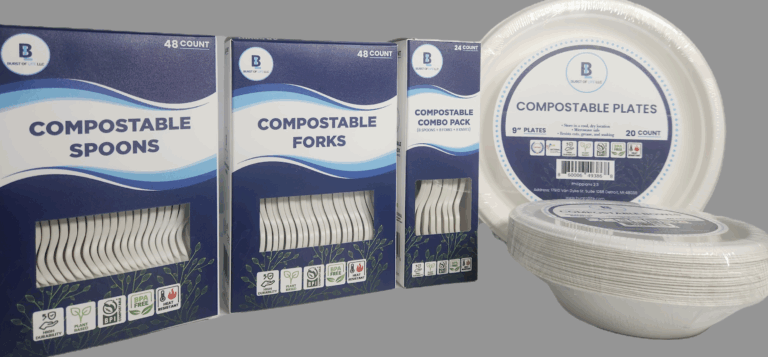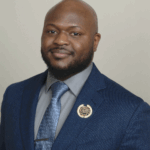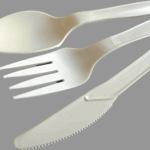
- Kim Kisner
- Business
- 09/09/2025
Burst of Life; Sustainable and Doing Good

Detroit-based entrepreneur Jarriel Brown is the founder of Burst of Life, a company with a dual mission: Creating good-paying jobs that help build community wealth and producing sustainable, plant-based compostable tableware that reduces environmental impact. For Brown, the business is not only about cutlery and compostables, but about opportunity, equity, and a commitment to Detroit’s future.
SBN Detroit sat down with Brown to discuss the origins of Burst of Life, the role sustainability plays in his work, and how local entrepreneurship can spark both economic and environmental change.

Q: What personal experience or insight drove the creation of Burst of Life?
A: It came in two parts. My military and National Guard service gave me perspective — I traveled around the world and saw certain trends. But it hit home when Trayvon Martin was killed and later during the Flint water crisis. I was part of the response team there, going door to door and seeing people suffering — families of all ages, people who looked like me and people who didn’t. They all lacked control over their environment.
As an electrician in the military, I asked my supervisor why we couldn’t do more. He told me we didn’t have the authority. That left me angry and determined. In 2019, I began learning much more about entrepreneurship through Global Empowerment Ministries, and I knew I wanted to create a company that could directly help people who were being overlooked. Burst of Life is my vehicle for that — to create jobs, build wealth, and use philanthropy as a driver for community change.
Q: Why sustainability? Why plant-based materials?
A: That also came from my time in the field. If we left behind forks or spoons, the environmental team would hold us accountable. It made me think about plastics differently. Later, I learned how plastics affect the body and environment — even contributing to birth defects.
So, I decided to make plant-based products instead. Sustainability isn’t just about cutting down on waste; it’s about making healthier choices for people and the planet. I also envision running community cleanup programs — boots on the ground, removing trash, improving water, and land quality.
Q: How is the material you use different from bamboo or other options?
A: Our products are cornstarch–based. Bamboo is strong, but it can break and sometimes leaves a wood taste with food. Cornstarch offers better heat resistance and durability, while still breaking down naturally. It feels like plastic, but it isn’t plastic. Our utensils can turn to ash like bamboo, without releasing toxins.
Q: What challenges have you faced in gaining adoption, especially from larger clients?
A: The biggest challenge is size. Larger retailers are used to working with suppliers who can deliver on big orders without much flexibility. Still, I’ve been fortunate — our products are on the shelves at Meijer, Fresh Thyme Market, Zerbo’s, and others.
To grow, we’re diversifying. We’ve expanded beyond cutlery into plates, bowls, and combo packs. We’re also targeting restaurants, which is a natural next step.

Q: Burst of Life positions itself as more than a product company — it’s a movement. What does sustainability mean to you, and how is it woven into your business model?
A: For me, sustainability includes community well-being. I grew up in Detroit and Chicago, where unemployment and crime often went hand in hand. I wanted Burst of Life to do more than sell products. I wanted to create jobs with good wages and benefits, and to hire from the community — including returning citizens and veterans.
By helping people build wealth, we can strengthen families and neighborhoods. For me, that’s as important as making eco-friendly products.
Q: How quickly do your utensils break down, and what impact does that have on waste in Michigan?
A: In industrial composting, our products break down in about ten years — much faster than plastic, which can take hundreds. On a smaller scale, they can be burned safely in a campfire or bonfire, turning to ash without toxic fumes.
Q: You’re a certified Minority Business Enterprise (MBE) and Service-Disabled Veteran-Owned Small Business (SDVOSB). How do equity and representation shape your commitments?
A: Within the communities and places I’ve traveled to I have seen a lot of poverty, unemployment, and incarceration — realities that have hit African American communities especially hard. Burst of Life is about creating opportunities where they’re needed most.
I also focus on hiring veterans. No veteran should be homeless, and jobs are one way to address that. Down the line, I want to create mentorship programs to help others build wealth and stability. It’s about creating a cycle of impact that goes beyond me.
Q: Are there local collaborations that have supported your growth?
A: Yes, my company began with support from Global Empowerment Ministries in Detroit. Their mentorship helped me understand entrepreneurship as something bigger than personal success.
I’m also part of the Veteran Owned Business Roundtable, which connects me with other veteran entrepreneurs. And being part of a network of more than 4,000 entrepreneurs gives me constant support and shared learning.
Q: How do you see sustainability practices evolving in Metro Detroit and Southeast Michigan in the next five years?
A: My vision is to combine product innovation with direct community action. I’d like to see companies like mine not only offering sustainable products but also leading clean-up efforts and promoting environmental education.
Detroit doesn’t always look like Bloomfield Hills — but there’s no reason it can’t. Sustainability is part of that transformation.
Q: If you could leave other small businesses in the region with one piece of guidance on building with purpose, what would it be?
A: Don’t give up. You’ll hear no a lot, and things won’t always look promising. But you have to believe in your vision more than anyone else does. Be your own biggest supporter.
Be sure to subscribe to our newsletter for regular updates on sustainable business practices in and around Detroit.
Kim Kisner
- All
- Business
- Community
- Education
- Events

Unique Monique Scented Candles, a Detroit-based business founded by Monique Bounds., aims to produce candles and household products with clean ingredients and local supply chains. What began as a personal hobby during college has evolved into a full-time venture producing coconut oil and soy-based candles made with essential oils and locally sourced materials. SBN Detroit interviewed Bounds about launching a sustainable product line, sourcing challenges in Michigan, and...

Eastern Market Partnership, in collaboration with the City of Detroit’s Office of Sustainability Urban Agriculture Division, has announced $240,000 in grant funding to support Detroit-based farmers and farmer collectives. The grants will advance food access, climate education, sustainable land use, and economic opportunity, with priority given to Black- and Indigenous-led farms, youth-led initiatives, and projects rooted in historically disinvested neighborhoods. The recipients – ranging from cooperatives and community...

Citizen Robotics is a Detroit-based nonprofit that advances the use of robotics and digital manufacturing in residential construction, focusing on improving productivity, sustainability, and long-term affordability. Best known for its early work in 3D-printed housing, it explores how alternative construction methods and new financial models can reduce material waste, lower lifetime operating costs, and enhance the resilience of homes. SBN Detroit interviewed Tom Woodman, founder and president of...







